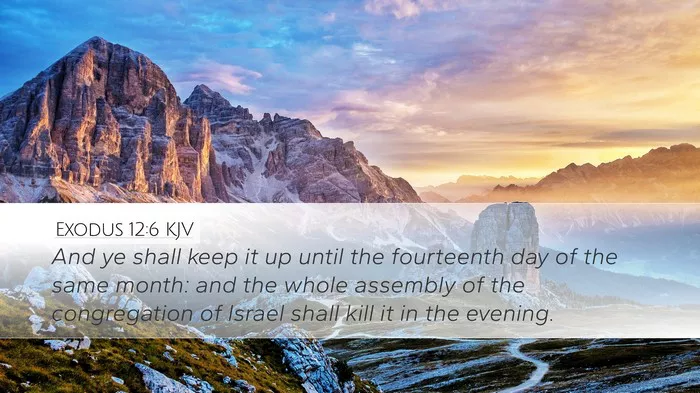Read the Daily Bible Verse – Exodus 12:6 To Strengthen Your Spiritual Journey.
Exodus 12:6 is a pivotal verse within the larger narrative of the Passover and the Israelites’ deliverance from Egypt. This verse encapsulates significant theological and practical truths, pointing to God‘s plan of redemption and foreshadowing the ultimate sacrifice of Jesus Christ. By examining the context, meaning, application, and modern relevance of this verse, we uncover profound lessons for both spiritual growth and daily living.
The Context on Exodus 12:6 KJV
The verse reads: “And ye shall keep it up until the fourteenth day of the same month: and the whole assembly of the congregation of Israel shall kill it in the evening.” (Exodus 12:6, KJV)
This verse occurs during God’s instructions to Moses and Aaron about instituting the Passover. At this point in the biblical narrative, the Israelites are in Egypt, enduring slavery under Pharaoh. God has performed nine devastating plagues, and the tenth and final plague—the death of the firstborn—is about to take place.
The Passover lamb is introduced here as a central element in God’s provision for Israel’s salvation. Specific instructions are given regarding its selection, care, and sacrifice, emphasizing the importance of obedience and preparation. The lamb had to be without blemish, symbolizing purity and foreshadowing Jesus, the Lamb of God.
In verse 6, God commands the Israelites to keep the lamb until the fourteenth day of the month and then have the whole assembly kill it at twilight. This detailed preparation and communal involvement highlight the weightiness of the moment and the need for unity and faith in God’s deliverance.
The Exodus 12:6 Meaning
The Role of the Lamb
The lamb represents substitutionary atonement. Its death serves as a substitute for the lives of the firstborn in every household. The lamb’s blood, applied to the doorposts, would signal God’s mercy and protection, sparing the household from the impending plague.
The Timing
The timing of the sacrifice—on the fourteenth day at twilight—was precise. This specificity underscores God’s orderliness and the significance of His plans. The lamb was kept for several days to ensure it was without defect, mirroring the anticipation of Christ’s sacrifice, which came “in the fullness of time” (Galatians 4:4).
Communal Participation
The phrase “the whole assembly of the congregation of Israel shall kill it” highlights collective responsibility. It wasn’t an individual act; it was a communal act of faith and obedience. This collective nature of the sacrifice foreshadows the shared unity in Christ’s death and the fellowship of believers.
Exodus 12:6 Application in Life
Faith and Obedience
The Israelites’ adherence to God’s instructions demonstrates the importance of faith and obedience in experiencing His deliverance. Today, believers are called to trust in Christ’s finished work and obey His commands.
Preparation for Redemption
The Israelites were to carefully guard the lamb until the day of sacrifice, symbolizing the need to prepare our hearts for spiritual renewal. Christians are encouraged to approach God with reverence and intentionality, recognizing the cost of redemption.
Community in Worship
The collective nature of the Passover sacrifice serves as a reminder of the importance of community in worship and spiritual practices. The church, as a body of believers, is called to share in Christ’s sacrifice through communal acts such as the Lord’s Supper.
Comparison with Other Biblical Texts
The Sacrificial System
Exodus 12:6 lays the foundation for the sacrificial system outlined in Leviticus. The lamb without blemish becomes a recurring theme, pointing to the holiness required for atonement. Leviticus 17:11 emphasizes the necessity of blood for the atonement of sins.
The Lamb of God
John 1:29 identifies Jesus as “the Lamb of God, which taketh away the sin of the world.” The parallels between the Passover lamb and Christ are striking: both were without blemish, chosen for sacrifice, and instrumental in delivering God’s people from death.
The Last Supper
During the Last Supper, Jesus redefines the Passover meal, identifying His body and blood as the ultimate sacrifice (Luke 22:19-20). This connection underscores the continuity between the Old and New Covenants.
Modern-Day Relevance
Christ as Our Passover
Paul writes in 1 Corinthians 5:7, “For even Christ our Passover is sacrificed for us.” This declaration ties the ancient Passover to the present-day reality of Christ’s sacrificial death, reminding believers of their deliverance from sin.
Living in Anticipation
Just as the Israelites prepared for God’s deliverance, Christians are called to live in anticipation of Christ’s return, remaining faithful and vigilant (Matthew 24:42-44).
Unity in Worship
Exodus 12:6 highlights the communal aspect of worship. In a modern context, this challenges believers to foster unity within the church, prioritizing collective worship and service.
Conclusion
Exodus 12:6 is a verse rich with theological significance, practical application, and spiritual insight. It not only recounts a key moment in Israel’s history but also foreshadows the ultimate redemption through Jesus Christ. For modern believers, this verse serves as a reminder of the importance of faith, obedience, and community. It challenges Christians to live in anticipation of God’s promises and to embrace the unity found in the body of Christ.
Through careful study of Exodus 12:6, we gain a deeper appreciation for God’s plan of redemption, the cost of salvation, and the call to live as a people set apart for His purposes.
Exodus 12:6 Commentary
Biblical scholars often emphasize the typological significance of Exodus 12:6. The lamb’s role as a substitute points directly to Christ’s atoning sacrifice. Additionally, the timing of the sacrifice at twilight is seen as a foreshadowing of Christ’s death, which occurred at a similar time of day.
The communal aspect of the sacrifice is frequently noted as a precursor to the church’s collective participation in the body of Christ. This unity underscores the importance of shared faith and the corporate nature of salvation.
Related Topics:
- What Does Exodus 12:5 Mean?
- Exodus 12:4 Meaning, Context & Commentary
- What Does Exodus 12:3 Mean?

